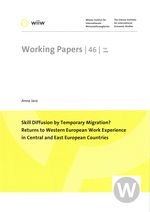Skill Diffusion by Temporary Migration? Returns to Western European Work Experience in Central and East European Countries
Anna Iara
wiiw Working Paper No. 46, July 2008
43 pages including 14 Tables
This paper contributes to the debate on the effects of migration by providing evidence on the returns to working experience from western Europe in eastern European labour markets. In particular, using the 2003 Youth Central and Eastern Eurobarometer dataset, we test the hypothesis that there are differential returns to foreign as opposed to domestic work experience.
Our analysis combines the Mincer wage equation framework and the Roy model of migration. The latter suggests that migration responds to net expected benefits. Hence, return migration is endogenous with respect to differential returns to foreign working experience. To allow for selectivity on observable or unobservable characteristics, we estimate an endogenous switching model in two steps. This procedure combines probit estimates of propensities to work and to acquire foreign work expericence respectively, and OLS estimates of earnings equations for stayers and movers, with the inclusion of nonselection hazards obtained in the first step. The expected wage increase is the difference between post-return migrants' wages and wages under similar conditions in the absence of migration. For any individual, only one of these measures can be observed. We impute the respective counterfactuals from the separate wage regressions.
Our analysis shows that movers and stayers are rewarded for different human capital characteristics. We find an average earnings premium for foreign work experience of around 30%. This can be seen as partial evidence for international skill diffusion: temporary migrants may upgrade their skills by learning on the job in countries with higher technological development, and subsequently bring human capital to their source country, thus adding to know-how diffusion and the catching-up of their economy. We perform additional empirical analyses to support this interpretation: we show that the premium found for return migration does not primarily reward the language proficiencies of returning migrants, and we further provide indicative evidence that no earnings premium is obtained for work-related stays abroad in other central and eastern European transition countries.
Keywords: Central and Eastern Europe, return migration, wage premium, skill diffusion
JEL classification: J31, J61, O15
Countries covered: New EU Member States
Research Areas: Labour, Migration and Income Distribution
